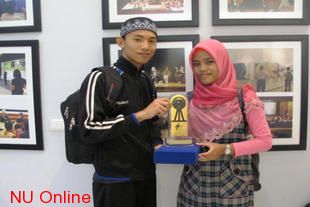Jakarta, NU Online
Students from ten Islamic schools across Indonesia gathered in Jakarta in late June to participate in the first-ever Santri Film Festival, showcasing student-made documentary films on themes of tolerance and peace. <>
The festival was a follow-up to a series of counter-radicalisation programmes at pesantrens considered "hotspots", according to Agus Nahrowi, programme manager at the Indonesian chapter of Search for Common Ground (SFCG), a non-governmental organisation focusing on conflict prevention.
Starting in January, SFCG held three-month long workshops for the Islamic school students (santris) on documentary film-making – then decided to host a film festival to share the results.
In April, it received 21 student-made films with themes of tolerance, diversity, peace, non-violence, and traditional culture, from ten pesantrens in Banten, West Java, Central Java, East Java, South Sumatra, and South Sulawesi provinces.
"We hope through this festival, viewers can have a better understanding of these young santris' world in pesantrens and what they feel through their ideas, aspirations, and their creative processes," Agus told Khabar Southeast Asia.
Dance film takes top prize
A team of students from Pesantren Sabilul Hasanah in Banyuasin, South Sumatra, took the top prize of the festival for their film, which explores whether the Javanese traditional dance Kuda Lumping (Flat Horse) is a form of polytheism that violates Islamic laws.
The film's lead actress, 16-year-old Susi Yutika Sari, told Khabar she was very happy about the film's achievement, especially considering that the story came from her own experience.
In the film, Susi ditches her dancing passion after she becomes a santri because her Qur'an recital teacher tells her the dance is laden with mysticism and sinful for her to perform. During the main segment of the dance, performers can enter a trance-like state and are said to be possessed by spirits.
Eventually she resumes dancing, with her parents' support, after deciding that her role in the opening segment of the dance does not conflict with values as an observant Muslim.
"We want to send the message that we can still perform this dance and preserve it as part of our cultural heritage without compromising our Islamic values," said Susi, who is of Javanese descent and comes from a family of Kuda Lumping performers.
Correcting misperceptions
Another film selected for the festival seeks to correct a widely-subscribed misperception that pesantrens are a breeding ground for terrorists.
The film, called "Santris Are Not Terrorist Seeds," was made by students from Pesantren Al-Ghazaly in Bogor, West Java – a province considered to be a hotbed for radicalism and growing Muslim conservatism.
Production team member Annisa Nur Munawaroh, 16, said the film is about proving to the world that santris can be creative in making films, not in "assembling bombs".
It follows Ilham Kurniawan, a santri at Pesantren Al-Ghazaly, who went on a quest for answers to his concerns about public perceptions associating pesantrens and their students with terrorism.
He visits a church near his pesantren and meets with a priest to confirm this perception. It turns out that the priest disagrees with the perception, and emphasises that all human beings are created and nurtured to do good things.
"As santris, we are labeled as synonymous with terrorism, and sometimes people mock us as fanatics because of the way we dress. We often feel cornered with such stigma," Annisa said.
She added that, contrary to the misperceptions, santris can take part in nurturing peace and religious tolerance and prove that Islam is a "peace-loving" religion.
Access to the world
Yenny Wahid, executive director of the Wahid Institute, a festival sponsor, said film-making can provide santris with access to a world outside their pesantrens, and reduce the perception that they are reclusive and isolated.
"This provides them the opportunity to express their creativity but still within our corridor on peace and tolerance. We hope they can be the agents for peace in the future," Yenny said.
The festival runs for a month in Jakarta, Bandung, Tangerang, Bogor, Lebak, Tasikmalaya, Cirebon, Solo, Lamongan, Palembang, and Makassar. SFCG is thinking of making it an annual event, given the positive response from the students.
Editing by Sudarto Murtaufiq
Terpopuler
1
Panduan Shalat Gerhana Bulan Petang Ini, Mulai Niat hingga Salam
2
PBNU Instruksikan Qunut Nazilah Respons Agresi Israel-AS ke Iran
3
Jadwal Cuti Bersama dan WFA Lebaran 2026, Total Libur Capai 16 Hari
4
Ketua Umum PBNU Mengutuk Serangan AS-Israel atas Iran
5
Khutbah Gerhana Bulan: Tanda Kekuasaan Allah dan Kesempatan Beramal Saleh
6
Amalan-amalan yang Dianjurkan ketika Terjadi Gerhana Bulan
Terkini
Lihat Semua
















